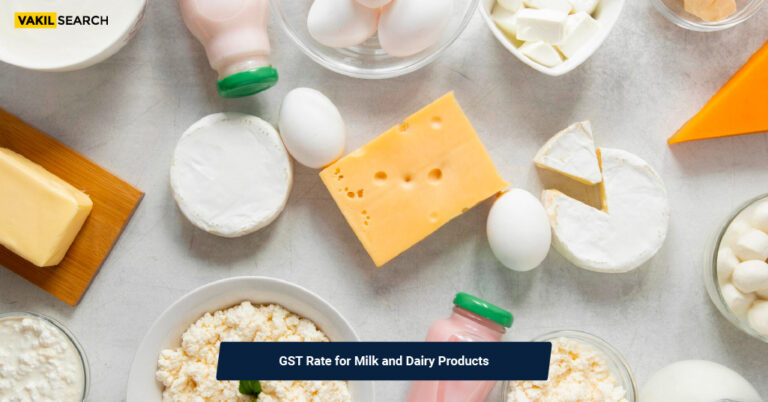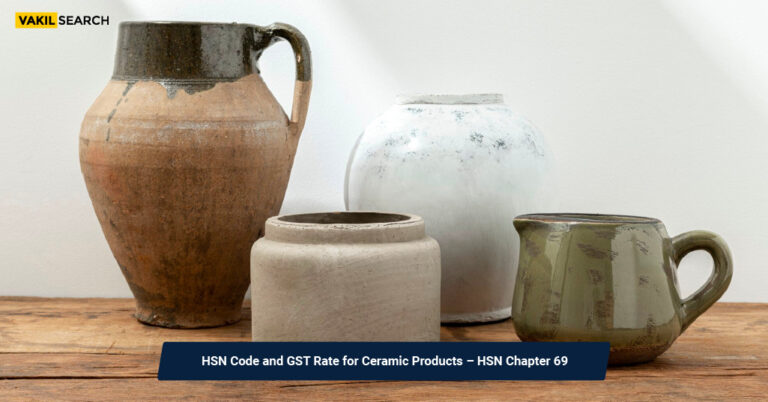GST relief! Rice, wheat, most cereals & flour are GST-free (but not pre-packaged ones). HSN codes: Rice 1006, Wheat 1001, others 1004. Check for branded/packaged items (5% GST). Read to know more !
Effective 1 July, 2017, GST registration and compliant invoices are mandatory for all businesses. While most cereals and flour fall under Chapter 10 & 11 of HSN codes (0% GST), pre-packaged items attract 5% GST. This article explores the intricacies of GST rates for rice and essential food products.
GST Rates for Rice – Overview
Good news! Rice, wheat, most cereals, and flour enjoy a 0% GST rates in India, making them essential and affordable for everyone. However, keep these points in mind:
- Pre-packaged or branded items: Even if the staple itself is exempt, packaged versions attract a 5% GST.
- HSN codes: Rice falls under HSN code 1006, wheat under 1001, and other cereals under 1004.
- GST registration & invoices: All businesses dealing in these products still require GST registration and must comply with invoice format rules.
| Product | HSN Code | GST Rates |
| Rice (loose) | 1006 | 0% |
| Wheat (loose) | 1001 | 0% |
| Most Cereals (loose) | 1004 | 0% |
| Flour (loose) | 1102 | 0% |
| Pre-packaged or Branded versions (any of the above) | N/A | 5% |
Taxation of Rice, Wheat, Cereals & Flours under GST
Rice, wheat, cereals, and flours play a crucial role in the Indian diet, and their taxation under GST is designed to be largely affordable and accessible.
General Rule:
- Loose (unpackaged) rice, wheat, most cereals, and flour: 0% GST. This covers the staples enjoyed by the majority of the population.
- Pre-packaged or branded versions of any of the above: 5% GST. Packaged items, even if containing exempt staples, incur this tax.
HSN Codes:
- Rice: HSN code 1006
- Wheat: HSN code 1001
- Other cereals: HSN code 1004
- Flour (loose): HSN code 1102
GST Rates for Specific Products
- Cereal groats, meal, and pellets (put up in a unit container and bearing a registered brand name): 5% GST
- Cereal grains otherwise worked (for example, hulled, rolled, flaked, pearled, sliced or kibbled), except rice; germ of cereals, whole, rolled, flaked or ground: 5% GST (Note: This includes oats, maize, etc.)
- Meal, powder, flakes, granules and pellets of potatoes: 5% GST
- Meal and powder of the dried leguminous vegetables (pulses), of sago or roots or tubers or the products of chapter 8 of HSN code (e.g., tamarind): 5% GST
- GST registration and proper invoice formatting are mandatory for all businesses dealing in these products, even if they are primarily exempt.
- Always check for packaging or branding before assuming a 0% GST rates.
- This information is current as of October 26, 2023. It’s advisable to consult official sources or seek professional advice for any specific situations.
GST Rates for Cereals
- Loose cereals: HSN code 1004 (e.g., maize, barley, oats) and HSN code 1102 (cereal flour) attract a 0% GST rate as long as they are not pre-packaged or branded.
- Pre-packaged or branded cereals: Even if the loose cereal itself is exempt, packaged versions attract a 5% GST.
GST Rate for Products of Milling Industry
- Milled rice and wheat: HSN code 1006 for rice and 1001 for wheat attract a 0% GST rate as long as they are not pre-packaged or branded.
- Milled cereal products: Other milled cereal products like rolled oats, flaked corn, etc., may fall under different HSN codes and may have different GST rates depending on the specific product and its processing. Check the specific HSN code for the product in question.
Impact on Consumers and Businesses:
- Consumers: The 0% GST rate on essential food items like rice, wheat, cereals, and loose flours has significantly benefited consumers by making them more affordable. This helps low-income households stretch their budgets further and increases access to nutritious food.
- Businesses: While the exemption benefits consumers, it can pose challenges for businesses. Managing separate inventory for loose and packaged versions of the same product can be complex, and the exemption can incentivize some unscrupulous businesses to misclassify packaged items as loose to avoid GST.
- Comparison to VAT: Under the previous VAT regime, most food items had a lower tax rate than the current 5% GST rate for packaged cereals. However, the exemption for loose cereals and flours under GST provides broader tax relief than VAT for these essential items.
Specific Scenarios and Clarifications:
- Examples of pre-packaged cereals with 5% GST: Any branded rice, wheat flour, or other cereal products sold in sealed packets or containers attract the 5% GST rate. For example, packaged basmati rice, branded atta flour, or instant oats mixes all fall under this category.
- GST on processed cereal products: Breakfast cereals, bakery mixes, and similar products usually have higher processing and ingredient costs. These products typically fall under different HSN codes and may have varying GST rates depending on their specific composition. Consult the specific HSN code and ingredients list to determine the applicable GST rates.
- Penalties for non-compliance: Businesses not complying with GST requirements for these products can face penalties like late filing fees, interest on unpaid taxes, and even prosecution in severe cases. Ensuring proper registration, invoice formatting, and timely filing is crucial to avoid penalties.
Future Updates and Developments:
- Upcoming changes: While no immediate changes to GST rates for these food items are announced, the GST Council periodically reviews and updates rates. It’s essential to stay updated through official sources like the GST website to be aware of any future changes.
Compliance and prevention of tax evasion: The government implements various measures to ensure compliance, including audits, inspections, and data analytics. Additionally, raising awareness among consumers and businesses about proper invoicing and reporting practices helps curb tax evasion in the sector.
FAQ on GST Rates for Rice
What is the GST on puffed rice?
Puffed rice attracts a 5% GST rate, as it's considered a processed cereal product. This applies to both loose and packaged puffed rice.
Why is there GST on rice in India?
While loose rice (HSN code 1006) is exempt from GST, pre-packaged or branded rice (e.g., branded rice bags) attracts a 5% GST. This distinction is made to maintain a balance between affordability of essential staples and revenue generation
What is an HSN code, and why is it important for these products under the GST regime?
HSN (Harmonized System of Nomenclature) codes are globally standardized codes used to classify goods. They're crucial for determining the correct GST rates and ensuring accurate tax collection.
How do I determine the correct HSN code for different varieties of rice and wheat when filing GST returns?
You can use Vakilsearch HSN tool and talk to our expert to know more!
Are there different GST rates applicable to various types of cereals, and how can businesses ensure compliance?
Yes, GST rates vary for different cereals and processed products. To ensure compliance:
1.Identify the correct HSN code: Use the government's HSN code database or consult a tax advisor.
2.Apply the corresponding GST rate: Charge and collect GST at the correct rate based on the HSN code.
3.Maintain proper records: Keep invoices, purchase orders, and other documents for GST audits.
4.File GST returns accurately: Report sales and GST collected on different cereals in your GST returns.
5.Stay updated: Check for any changes in GST rates or rules from the government.










